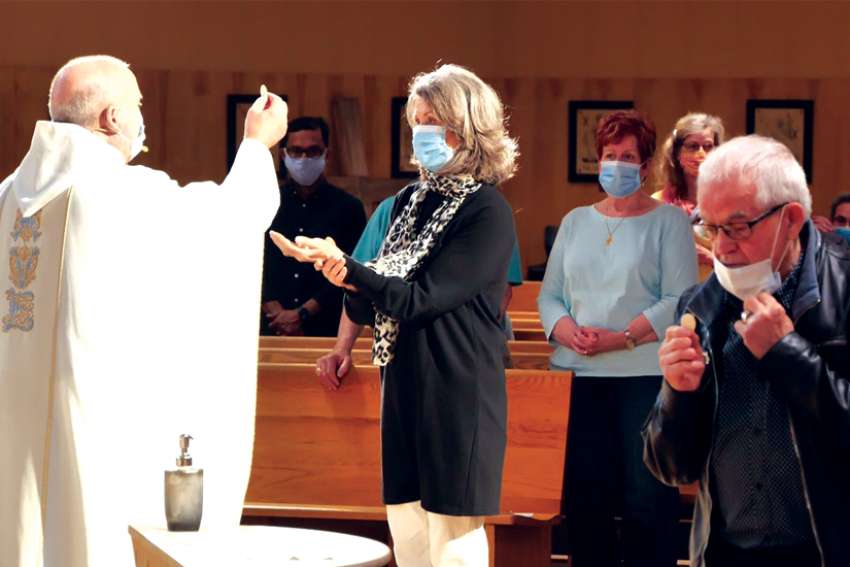Churches will be allowed to seat up to 30 per cent of capacity — the highest allowance in Canada — for public Masses starting June 12. Premier Doug Ford announced the loosening of restrictions June 8 as Ontario moved into Stage 2 of its plan to re-open society in the wake of the coronavirus pandemic that has shut down the province since mid-March.
With Ontario churches reopening, Quebec is the only Canadian province yet to resume public Masses in some form.
But the decision doesn’t mean all Catholic churches in Ontario will re-open June 12. Churches will need to develop protocols to provide added hygiene, allow parishioners to maintain proper distancing and ensure that no more than 30 per cent of the pews are occupied. Those precautions will require extra volunteers and, in many cases, a decision on whether the seats will go on a first-come-first-serve basis or if a reservation system or other seating method will be implemented.
“We thank Premier Ford and Minister Monte McNaughton, who co-ordinated and liaised with faith communities during this period of pandemic, for their efforts in recognizing the importance of places of worship for so many Ontarians,” said Cardinal Thomas Collins, Archbishop of Toronto, in a statement welcoming the move. “We also appreciate the opportunity for constructive dialogue over the last number of weeks regarding our concerns and suggestions for a path forward.”
London Bishop Ronald Fabbro said the news must be tempered with patience and health and safety remains paramount.
“I ask for your patience. We have been working hard to prepare for the re-opening of churches, but we will need to make sure our communities can worship safely,” said Fabbro.
Neil MacCarthy, director of public relations and communications at the Archdiocese of Toronto, said there are details to be worked out, safety being the key.
“You have to make sure when you open you can do it safely and that’s going to be the first priority so we don’t want to rush,” he said. “But at the same time we want to make sure we can open as soon as possible.”
Robert Du Broy, communications director for the Archdiocese of Ottawa-Cornwall, said some churches in the diocese are more prepared to open quickly than others. He said it will be left to individual churches to decide if they have the necessary number of volunteers and sanitary precautions and other safe-distancing measures in place to operate at 30-per-cent capacity.
The Ottawa-Cornwall archdiocese has been preparing a checklist of what churches need to do to re-open safely.
It’s similar in the Diocese of Hamilton. Bishop Douglas Crosby said the re-opening brings new challenges. Church will not look the same as it did pre-pandemic, he said.
“We can expect instructions about social distancing, use of hand sanitizers and face masks, and how to receive Holy Communion, among other things,” said Crosby. “We count on the goodwill of everybody to assure the safety of priests and congregation. Some of this will not be easy but together we can do it.”
“Definitely there are going to be some things that are a little different than what we’re accustomed to,” said MacCarthy.
MacCarthy said final instructions were being worked out among Toronto’s Council of Priests and were to be released June 10 (after The Register’s deadline). Many of the precautions are sure to mirror those of dioceses which have re-opened in other parts of Canada. These include empty holy water fonts, and masks will be highly recommended but not mandatory. But some decisions will be left up to each parish, including how they choose to allow parishioners back into the pews.
“Parishes are going to be left to decide if they want to do a reservation system or if they want to just open their doors and say first come first served or if they employ a method like Mass by last name — this one is for seniors,” said MacCarthy, adding the archdiocese has held a number of webinars to prepare for this.
London is finalizing a detailed plan, which hadn’t been released by press time, but Fabbro has asked parishes that have been live-streaming Masses to continue to do so where possible for those that may not be able to gather due to the number restrictions.
Collins recognizes it’s been a “painful and difficult period” for so many and praised parishioners for waiting this out.
“I am grateful to Catholics throughout the archdiocese for their patience and understanding as we worked collectively to minimize the potential spread of COVID-19 over the past several months,” he said.
Now that Mass can resume, the bishops can’t hide their joy.
“It will be a pleasure for me to celebrate once again with the sisters and brothers of faith in attendance,” said Crosby.
(With files from Brian Dryden, Canadian Catholic News)


